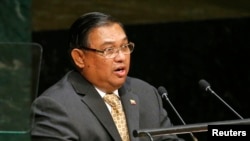Myanmar (also known as Burma) has offered an official apology to China over a bombing accident last month near the two countries' border that killed five Chinese farmers as they were working in their fields. Myanmar has been fighting ethnic rebels in the north for nearly two months and the violence has forced tens of thousands of refugees to flee, many into Chinese territory.
China’s Foreign Ministry said a joint investigation into the incident determined that Myanmar was responsible for the accident and that one of its warplanes had dropped a bomb on a sugar cane field in Chinese territory.
Myanmar Foreign Minister Wunna Maung Lwin extended his country’s apologies to those killed and injured during a meeting Thursday with his Chinese counterpart Wang Yi.
China’s Foreign Ministry said in a statement that Myanmar offered compensation and pledged to punish those responsible. Myanmar also said it will strengthen measures to ensure that such an incident does not happen again.
Initially, Myanmar denied that it was responsible and instead blamed the rebel Myanmar National Democratic Alliance Army group it is fighting in the north.
In response, China boosted its military presence along the border, launching air border patrols and deploying land-based surface-to-air missiles. Beijing warned that if any other intrusions occurred, it would take decisive actions.
As many as 80,000 displaced
China’s border area town of Nansan is almost completely inaccessible to outsiders and looks much like a military zone in pictures posted on social media sites. At least three checkpoints have been put up to keep foreign journalists away from the area. International aid groups are also being denied access to refugees who have fled the fighting.
The Chinese government previously said that some 30,000 people have fled Myanmar’s northern Kokang area across the border in China, but aid groups say as many as 80,000 displaced persons are there now.
Those who can afford it are staying in local hotels or renting space from local residents. Groups such as the China Red Cross Society have provided emergency shelter for several thousand. But aid workers say most are staying in makeshift tents near rivers, the roadside or next to fields.
Li Na, a Kokang resident, fled her home with her daughter and family just before the fighting began. Since then, she has been helping other aid workers to meet the needs of those who have been displaced.
Li says that at first, the main priority was getting refugees settled - now there are a wide range of needs, from helping children get medical attention to providing the displaced with rice, vegetables and clothing.
Kokang conflict
Kokang is not far from the border and Li says that while there is frequent shelling, some very close and loud, the work keeps her from thinking about that too much. When asked what she thought of the conflict and who she supported, Li says no one.
Li says she remains neutral and does not support anyone who fights. She says she just wants to live a peaceful and simple life.
Rebels say they are fighting for the rights and autonomy of the Kokang people in Myanmar. But the area they are fighting to control is rich in mineral and forestry resources and has long been a lucrative source of narcotics such as heroin, despite efforts to stamp out the trade.
The MNDAA is led by ethnic Chinese rebel leader Peng Jiasheng who once led the area, but was ousted from power in 2009.
The MNDAA was formed from remnants of the Communist Party of Burma, a Chinese-backed guerilla force that fought the Myanmar government until splintering in 1989. The group reached a truce with the government shortly after that, which lasted until Peng was removed.




